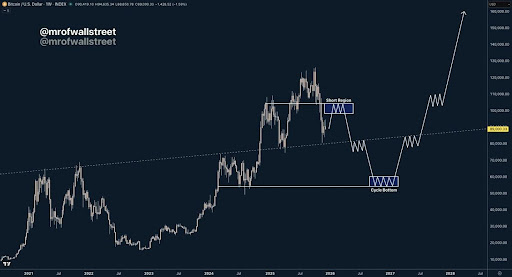Senator Pushes Blockchain Budget for Trust or Transparency?
- Senator Bam Aquino proposes blockchain for national budget to enhance transparency and accountability. - The system would allow real-time tracking of public spending, using Polygon’s network and BayaniChain’s infrastructure. - While still conceptual, the initiative aims to set a global precedent for fiscal accountability through immutable records.
Senator Bam Aquino of the Philippines has proposed a bold initiative to place the national budget on a blockchain platform, a move intended to enhance transparency and public accountability. Speaking at the Manila Tech Summit, Aquino emphasized that blockchain technology would allow citizens to track every peso of public expenditure in real-time. “No one is crazy enough to put their transactions on blockchain, where every single step of the way will be logged and transparent to every single citizen. But we want to start,” he stated. If implemented, the Philippines would become the first country to adopt such a system, according to Aquino, though he acknowledged uncertainty about the level of political support the initiative might receive [3].
The senator’s proposal builds on the Department of Budget and Management’s (DBM) existing blockchain platform, which has already begun recording selected financial documents. This system is recognized as the first live on-chain budget platform in Asia. Currently, it uses Polygon’s Proof-of-Stake network—a solution compatible with the Ethereum Virtual Machine—to provide transparency and consensus. The platform allows for the publication and verification of key budgetary documents, including Special Allotment Release Orders (SAROs) and Notices of Cash Allocation (NCAs), ensuring they are secured on-chain for public access and audit [3].
BayaniChain, a local blockchain infrastructure firm responsible for the DBM’s on-chain platform, expressed support for Aquino’s vision but clarified it has no formal ties with the senator. Paul Soliman, BayaniChain’s co-founder and CEO, noted that while blockchain is not a complete solution to corruption, it creates immutable records that can significantly improve accountability. The firm’s role involves linking the DBM’s internal systems to a public blockchain, enabling secure and verifiable transactions. The Prismo platform, a key component of this system, manages data encryption, validation, and orchestration, ensuring the integrity of financial data [3].
The initiative is part of broader efforts by Filipino officials to leverage technology for governance. Alongside the blockchain-based budget tracking, other projects include Project Marissa, a blockchain platform for budget transparency, and the Bagong Pilipinas Transport Chain, which aims to bring transparency to public transport management. These efforts are led by Paul Soliman, who has previously collaborated with Microsoft through Hacktiv Colab to integrate AI-powered workflows that enhance productivity [1].
Despite the forward-looking nature of these proposals, the blockchain-based national budget initiative is still in the conceptual phase. As of the latest available information, no formal bill has been filed to implement a system-wide on-chain budget process. The senator’s office has not yet responded to inquiries from Decrypt regarding further details of the proposal. However, the potential success of the initiative depends on legislative support and broader adoption of the technology within government systems [3].
If enacted, the blockchain-based budget system would represent a significant shift in public financial management, offering unprecedented levels of transparency and public oversight. While the technology alone cannot eliminate corruption, it could serve as a foundational tool for fostering trust between citizens and the government. As the Philippines continues to explore the integration of emerging technologies in governance, the proposed blockchain system may serve as a model for other nations seeking to improve fiscal accountability [3].
Source:

Disclaimer: The content of this article solely reflects the author's opinion and does not represent the platform in any capacity. This article is not intended to serve as a reference for making investment decisions.
You may also like
Quantum Computing Bitcoin: Michael Saylor’s Powerful Vision for an Unbreakable Future

1.18 Billion XRP In Four Weeks. Here’s What Whales Are Doing
PancakeSwap, YZi Labs Announce Zero-Fee Prediction Market on BNB Chain